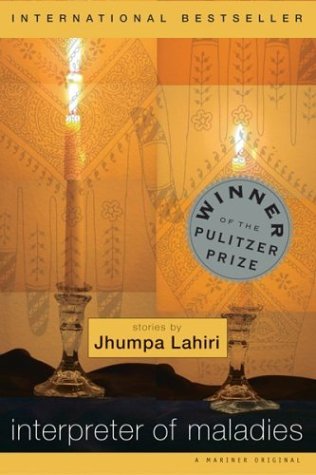All Nonfiction
- Bullying
- Books
- Academic
- Author Interviews
- Celebrity interviews
- College Articles
- College Essays
- Educator of the Year
- Heroes
- Interviews
- Memoir
- Personal Experience
- Sports
- Travel & Culture
All Opinions
- Bullying
- Current Events / Politics
- Discrimination
- Drugs / Alcohol / Smoking
- Entertainment / Celebrities
- Environment
- Love / Relationships
- Movies / Music / TV
- Pop Culture / Trends
- School / College
- Social Issues / Civics
- Spirituality / Religion
- Sports / Hobbies
All Hot Topics
- Bullying
- Community Service
- Environment
- Health
- Letters to the Editor
- Pride & Prejudice
- What Matters
- Back
Summer Guide
- Program Links
- Program Reviews
- Back
College Guide
- College Links
- College Reviews
- College Essays
- College Articles
- Back
The Interpreter of Maladies
The Interpreter of Maladies by Jhumpa Lahiri
“Somehow, without saying anything, it had turned into this. Into an exchange of confessions – the little ways they'd hurt or disappointed each other, and themselves.”
Lahiri explores the depths of these connections between human beings in her book, The Interpreter of Maladies. The collection comprises nine short stories, each one illuminating in a unique way how we interact with others.
In the first story, “A Temporary Matter,” Lahiri depicts the devastating impact of the loss of a child on a couple's relationship. In “The Interpreter of Maladies,” she writes about the meaning of a brief encounter between a dysfunctional family and their tour guide. In another, “The Treatment of Bibi Haldar,” she illustrates the complexity with which society handles an orphaned girl who suffers from violent, uncontrollable seizures.
Lahiri allows the troubles of her expertly and vividly portrayed characters to resonate powerfully with the reader. From a woman not yet thirty who has already fallen out of love with life to a one-hundred-and-three year old who rents rooms to college students because of loneliness, the characters of these stories exhibit lives filed with conflicts. Yet the reader can easily relate to each person. Some are in pain, others are faintly comical, and all are very human.
I found myself drawn in again and again by Lahiri's simple, eloquent writing style. I would highly recommend this book to those who enjoy reading about human nature and relationships, or those who simply take pleasure in fabulous writing.
Similar Articles
JOIN THE DISCUSSION
This article has 0 comments.

